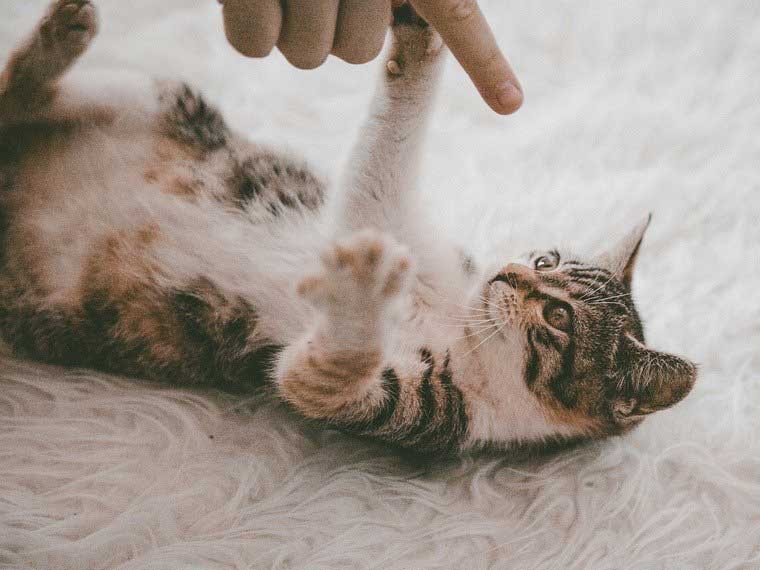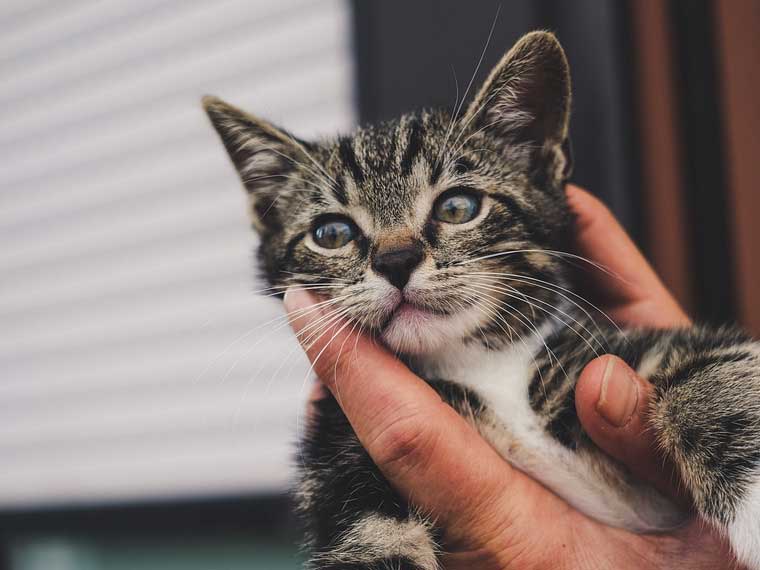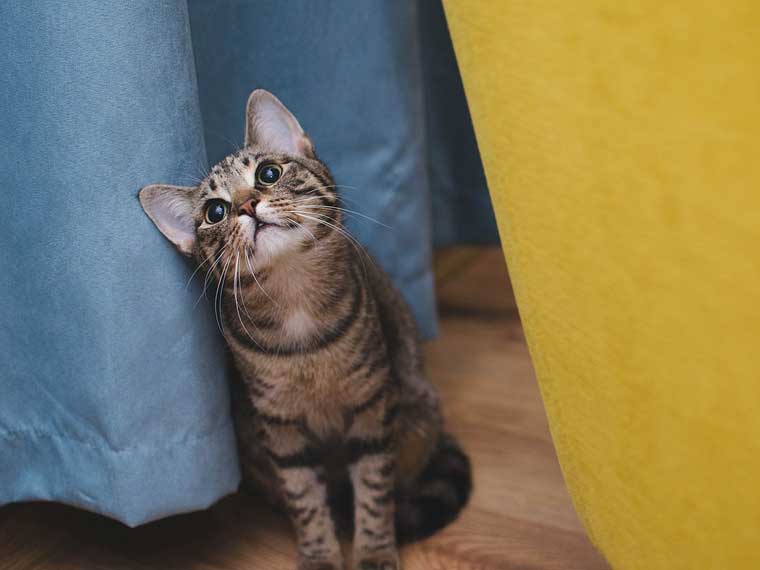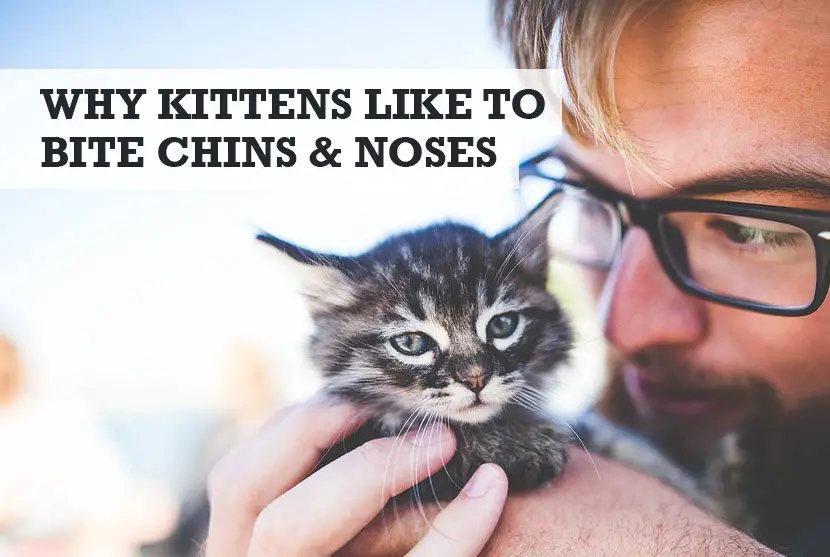Kittens are simply adorable and have some funny little habits. Some you might like, some you might not like. One habit which diversifies opinion is when kittens try to bite your chin and nose. It might be too ticklish for you, they might even bite too hard!
But regardless, why do kittens like to lick and nibble on human chins? Here’s the science behind it, with the very short answer first.
Why does my kitten bite my chin? Kittens like to bite chins and noses for reasons including play behavior, a way of teething, exploring the world around them, or it could be an indicator that your kitten lacks nutrients in their diet. Your chin might even just taste nice with salty sweat.
Below I’ve broken down the reasons in more detail, plus offer some guidance if you want to know how to stop a kitten from biting your chin and nose.
Why does my kitten bite my nose and chin?
1. Play behaviour and learning
Kittens engage in a behavior called play biting or mouthing, where they use their teeth to explore and interact with the world around them. Play biting is a physical exercise, and kittens need to use their teeth before using their claws during play.

Since playful kittens may bite your chin and nose you without meaning any harm, it’s essential to teach your kitten that play biting is unacceptable by teaching them appropriate behaviors.
Kittens learn through play. By putting your chin or nose in front of them, you are making yourself an easy target for their explorations. Kittens will often bite at new objects, but it’s essential to teach them that this behavior is unacceptable.
It is natural for kittens to explore using their mouths, and mouthing can be used as a training method with kittens to teach them not to bite too hard.
2. Teething
Like human children, kittens use their mouths to explore the world around them. Part of this development includes teething. As a teething kitten matures, its biting and teething will come into play.
An excellent way to prevent this behavior is to provide your kitten with small toys specially made for cats (here’s a good one on Amazon). Catnip also works as an effective tool when it comes to protecting your personal space.
It can be annoying, but it’s important not to yell at them or get too aggressive.
This will cause the kitten to become fearful of humans and increase their likelihood of biting in future interactions.
3. You chin and nose taste good
Another possible reason why your kitten bites your chin is because it’s taste good. Some cats like the taste of salty sweat. If you’ve just had a session on the treadmill and find your kitten can’t help bite your nose and chin, it could be the sweat taste their like!
4. Exploration
Kittens, like human babies, use their mouths to explore the world around them. By putting your chin and nose out there for kittens to bite and chew on, you may be encouraging this behavior.

It’s important for kittens to learn about the world they live in by exploring and chewing on objects with their sharp teeth, redirecting can encourage positive behavior.
Provide your kitten with soft toys or blankets to chew on instead of your chin. This will encourage them to chew on appropriate objects while keeping you safe from their sharp teeth.
5. Possible lack of nutrients in their diet
If your kitten is not getting the nutrients they need for healthy development, they may be more likely to display negative behaviors like biting your chin and nose. It’s essential to provide your kitten with high-quality food that will act as fuel for their bodies and prevent them from feeling hungry all the time.
A mother cat will groom her kittens to help them digest the food that she provides for them. If you are providing wet or dry food, it’s essential to check with your veterinarian about proper nutrition for kittens.
If your kitten lacks certain nutrients due to malnutrition, they may start to bite you to get the nutrients they need.
Some possible negatives in letting your kitten bite your chin and nose
If your kitten does not know their strength, it could draw blood, you “might” even develop an infection. Since cats groom their litter, they can easily pass on bacteria and other germs to their kittens, then through to you in saliva.
It’s best to prevent play biting before it starts by not putting your chin in front of them.
Here’s what the professionals say about cat bite infections.
Cat bites can be dangerous both to other animals and to humans. Cats carry a large number of bacteria that are capable of causing tissue infections in bite wounds. One of the more common is highly pathogenic bacteria known as Pasteurella multocida. An infected cat bite wound will be red, swollen, and painful, and infection can spread through the surrounding tissues, causing a condition called cellulitis, or through the blood to other areas of the body, causing blood poisoning.
VCA Hospitals, https://vcahospitals.com/know-your-pet/wounds-cat-bite-injuries-to-humans
Since kittens are still developing, play biting can be incredibly uncomfortable if it is too complicated or directed at an inappropriate body area. Small cat breeds are more likely to bite with little force than more giant cats, but all cats should understand appropriate and inappropriate behavior.
In some countries, kittens can also contract rabies if they are not vaccinated against it. The first step to preventing infection is by avoiding bites and scratches from your kitten.

Since rabies can also be transmitted through saliva, it’s essential to avoid getting bitten or scratched at all costs.
However, rabies in domestics cats in countries like the US and United Kingdom is virtually non-existent.
Handy Hint: Here’s when you should consider letting your kitten roam the house independently or at night.
How to stop your kitten from biting your chin and nose
If your kitten does not show any signs of stopping the nose and chin biting, it may be time to get strict with them.
Before you do so though, make sure that the kitten is not hungry or deprived of sensory stimulation. This could be a sign that they are trying to tell you something.
It’s important to note that while kittens require playtime and exercise, they should also focus on their environment and be aware of what is happening.
If the kitten has a toy, play with it as this will encourage them to use it as an outlet for their energy and curiosity. If you feel like your kitten is not biting to explore the world around them, re-evaluate how they are eating.
If your cat is not getting enough nutrients through their food or they do not know how to use their tongues properly, this may be causing them to bite you out of hunger or frustration after all.
Handy Hint: Kittens also like to lick the ear wax of their human owners, and there’s a bit of a weird reason for this too!
Whenever your kitten tries to bite your chin, scratch their head or chin, but not too hard. This should teach them that biting your chin could lead to a negative consequence while providing them with an alternative way to play with you.
It may be helpful to get down on the kitten’s level, so they do not feel threatened by towering over them.
Since kittens will play using their teeth and claws, teaching them how to do so healthily is essential. A couple of minutes of playtime with your kitten each day will provide them with the opportunity to learn from you.
When the kittens starts to bite your chin too hard, give them a light tap on the top of their head and say “no” firmly. This should encourage immediate behavior that serves as punishment for them.
If all else fails, wipe some bitter apple spray on your chin to discourage them from biting that area. Even if they do not understand what the spray tastes like, the smell will be enough to deter your kitten.
Be sure that you are providing your cat with high-quality wet food that has been developed for the nutritional needs of kittens. If you are unsure about their quality, talk to your vet about specific foods that they may recommend for your kitten’s particular needs.
Consider getting a second opinion from another veterinarian, as this can be especially important if you notice any changes in your cat. When you take your kitten to the vet, be sure that they are up to date on all of their vaccinations, so you do not expose them to unnecessary risks.
When your kitten is consistent with their play biting, they may have biting behavior issues that need to be addressed by a professional trainer. If the behavior persists, it may be necessary to investigate getting your kitten spayed or neutered.
Conclusion
Kittens are cute, cuddly, and playful.
They often use their paws and teeth to explore the world around them by batting at things like your chin and nose. While this may seem cute at first, it can be painful after a while.
But mostly, kitten bites are a sign that your kitten loves you. While many people think they are annoying, it’s essential to understand why kittens bite to prevent injury.
You might also like…
- Can you hold a crocodiles mouth shut with a rubber band?
- The correct age to start handling newborn kittens
- Why young kittens tend to throw up and be sick all the time
Image in header via https://pixabay.com/photos/man-kitten-pet-owner-kitty-tabby-1868563/



